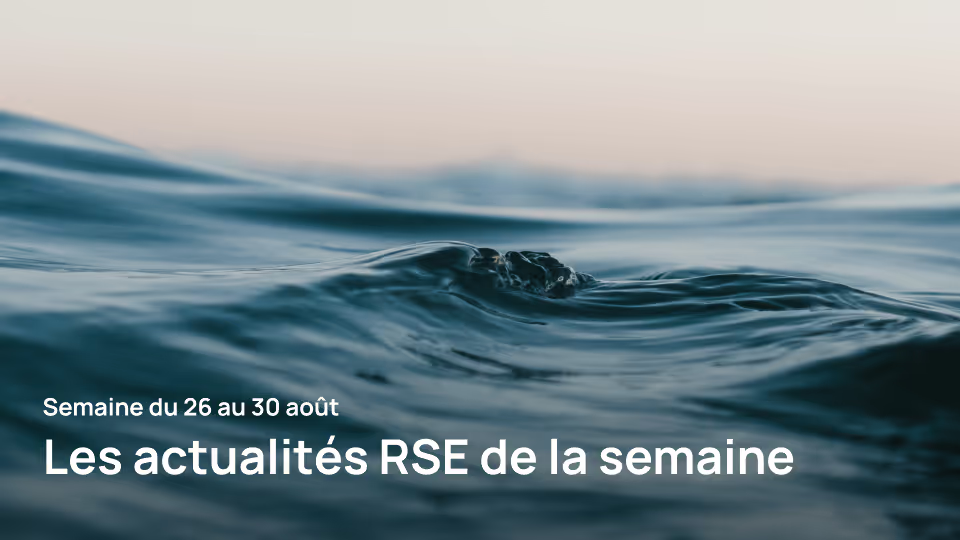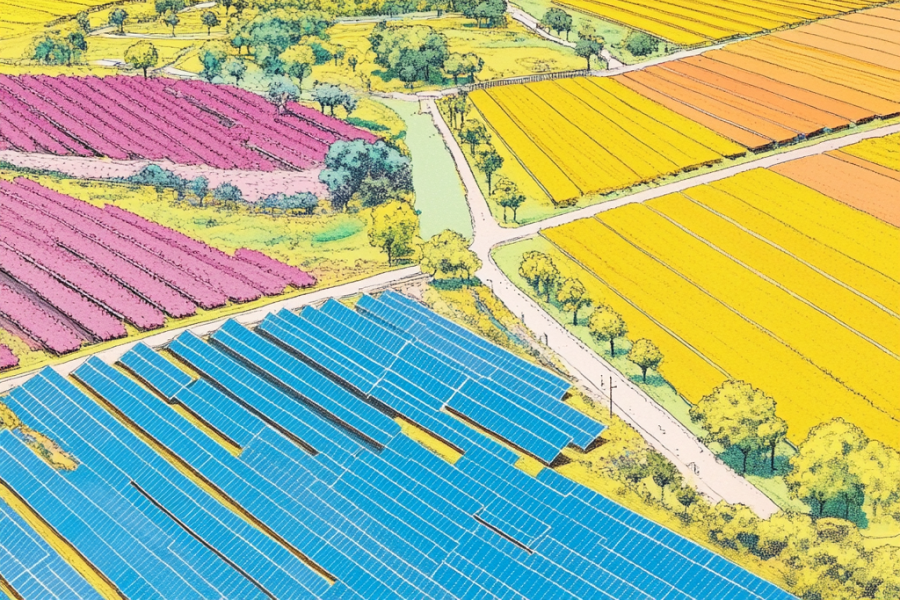This week, in CSR news, companies are moving the needle, whether by integrating sustainability at the heart of their strategy or by facing complex challenges.
We discover inspiring initiatives, such as the recycling of Olympic Games accessories, and major challenges, such as the ethical management of supply chains.
These news show how businesses are innovating and committed to a more responsible future.
Discover all the CSR news.
Ernst & Young focuses on CSR for its Entrepreneur Award
This year, on the occasion of the 2024 edition of the Ernst & Young (EY) Entrepreneur Award, CSR is selected as an essential rating criterion. According to Jean-Roch Varon, the new president of EY in France, “A company that is not committed is a company that will no longer exist.”
This change in mentalities reflects an evolution of models, at a time when CSR is widely recognized for its positive effects on innovation and business growth. We also notice that family businesses score better than others: probably because they are used to considering long-term strategies, as required by CSR.
As for start-ups, CSR is often even the raison d'être of their business model. 27% of candidates for the “Start-Up of the Year Award” work in greentech.
Child labour: Shein in turmoil
Shein discovered several cases of child labor on its supply chain. This announcement, made by the company itself, comes in the strategic context of its IPO, at a time when the commercial practices of this fast-fashion brand are already under severe criticism.
The two cases of child labour were identified at Shein suppliers located in China following an audit. Aged under 16, it is a blatant situation of violation of international rules.
Estimated at £50 billion, Shein's value on the eve of a possible IPO could suffer the repercussions. Especially since its commercial practices are already criticized: precariousness of workers, excessive hours, suspicion of forced labor in the Xinjiang region and plagiarism of certain clothing designs.
Employees with disabilities recycle Olympic accessories
A sewing workshop in Marseille employs disabled employees to make various bags, covers or even ottomans with the effigy of Phryge. An inclusive approach that intends to give a second life to the tarpaulins used during the Paris Olympic Games.
1,600 m² of canvas, from sailing and soccer events, are recycled through this initiative. Thus, it is a double valuation, both social and environmental.
Valérie Guarino, elected in charge of disability in the department of Bouches-du-Rhône, explains that the meaning of this approach is to “achieve sustainable, economic and social integration development”.
Circular economy indicators for businesses
The Circularity Measurement Factory is a think tank that has brought together 16 companies over the last two years in order to establish a method that aims to measure the impact of the circular economy strategy of Business models. Thus, a series of 30 indicators are the product of these consultations and intend to objectify and quantify economic circularity in order to “to accelerate the deployment of the model”.
Jules Coignard, co-founder of Circul'R at the origin of the project, said that recent normative innovations have a clarifying effect on the establishment of criteria and impact measures. For example, he mentions the CSRD, saying that its ratification allows “to accelerate the consideration of the subject by companies”.
The meaning of the approach is to identify and use the most relevant indicators that already exist, in order to allow companies to take control of them as naturally as possible.
12,000 billion evade taxes in tax havens
The United Nations has worked on a trajectory to effectively address the problem of tax evasion. According to the European Tax Observatory, nearly 12 trillion dollars would be housed in tax havens. This constitutes 12% of global GDP.
For example, the United Nations agreed on the objective of drafting a convention on international tax cooperation within three years. This includes measures to fairly tax multinationals and to combat tax evasion.
The European Tax Observatory states that “companies transfer around 36% of their revenue from outside the country where they have their head office to tax havens”. For the year 2022, the amount of these tax evasion and optimization practices amounts to 1000 billion dollars.
EU sued for lack of ecological ambition
Two NGO networks, the Climate Action Network Europe (CAN) and the Global Legal Action Network, are suing the European Commission. They blame it for the lack of ambition in its 2030 climate goals.
Considering that the objectives set by the EU are not the result of “best available scientific data”, the emissions limits and climate goals set by the EU are then deemed “illegal” by NGOs. This is the logic behind their legal action.
Thus, a hearing could take place as early as next year at the Court of Justice of the EU (CJEU) on the basis of European environmental law, but also on certain international commitments. The aim of the NGOs is to reduce the authorized levels of emissions within the 27.
When the economy suffers from climate change
Of course, the first victims of climate change are displaced persons, refugees and all human victims of its impact. But at another level of study, the global economy is also suffering from its effects. Sugarcane field fires, flooded factories, car production at a standstill... so many losses generated by extreme weather events.
“14 factories and 28 production lines shut down” in Japan by the Toyota Group, which is anticipating the arrival of Typhoon Shanshan. While in Bangladesh, textile production has fallen by 15 to 20% due to repeated floods, a disaster for the national economy that relies on this sector that makes the country the world's 2nd largest exporter.
Thus, favored by climate change, these extreme climate events must push companies to better anticipate, mitigate and adapt their production models to global limits.
Environmental DNA, a new method for studying biodiversity
The French government's National Biodiversity Strategy (SNB) reflects the desire to continue efforts to implement the Convention on Biological Diversity. In this context, a major project for the “comprehensive census of biodiversity” is under preparation.
To carry it out successfully, a new method called “environmental DNA” will be used. This technology consists in taking traces of living beings in their natural environment and then analyzing them in the laboratory.
Thus, it is non-invasive for natural environments and the species that live there. More environmentally friendly, this method offers the advantage of better understanding biodiversity while maintaining ecosystems.
Banks prefer to compensate rather than avoid climate risks
In an op-ed he gave to World The financier Jérôme Courcier pleads for the financial logics of banks, in particular central banks, to go in the direction of an absence of climate risk, rather than their sole compensation.
According to him, bankers prefer to anticipate risks by adjusting margins rather than reacting afterwards by increasing capital. In particular, he criticizes them for hiding behind the limits of their mandate (the caution and stability of the banking system) for not seriously taking on climate issues.
Thus, he affirms that “The ECB must take up the challenge of incorporating climate risk directly into banks' capital requirements”.
The UN sounds the alarm about rising sea levels in the Pacific
A “Global SOS” is launched by the UN which, following a series of reports and studies, notes that rising sea levels are affecting Pacific islands even more severely than the rest of the planet. For good reason, they have experienced a rise in sea level of 15 cm over the last 30 years, compared to 9.4 cm on average on other shores of the world.
The situation is one of great ecological injustice, in the sense that the small islands of the Pacific emit very small quantities of Co2 and yet are the states most endangered by this direct consequence of climate change.
This call was launched by Antonio Guterres, Secretary-General of the UN, who calls for the prevention of “a global disaster” whom “endangers this Pacific paradise.”
The sources
Les Echos “CSR, the new criterion for evaluating companies”
RSE Magzine “Shein discovers underage work at its suppliers”
Sustainable news “In Marseille, disabled employees are bringing Olympic tarpaulins back to life”
Youmatter “Circular economy: 30 indicators to follow to make your business progress”
Novethic “Tax havens: profits housed in offshore countries reach 12% of global GDP”
Novethic “The EU's 2030 climate goals under attack in court”
Novethic “Textile, sugar, automotive: when the global economy is affected by climate change”
Sustainable news “Biodiversity: what is environmental DNA?”
Le Monde, Tribune of 24 August by Jérôme Courcier
Le Monde “The UN launches a “Global SOS” on rising seas in the Pacific”
Bon à savoir : Lorem ipsum dolor sit amet, consectetur adipiscing elit, sed do eiusmod tempor incididunt ut labore et dolore magna aliqua. Ut enim ad minim veniam, quis nostrud exercitation ullamco laboris nisi ut aliquip ex ea commodo consequat. Duis aute irure dolor in reprehenderit in voluptate velit esse cillum dolore eu fugiat nulla pariatur.


.avif)


